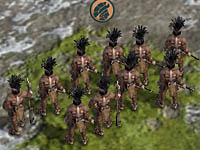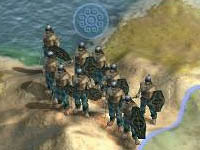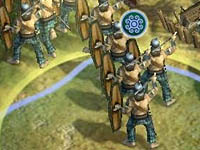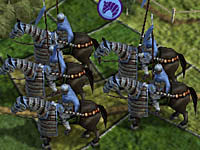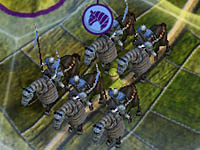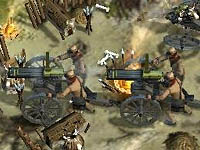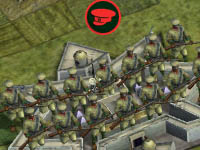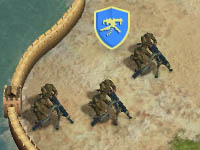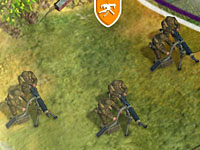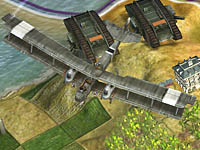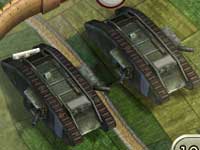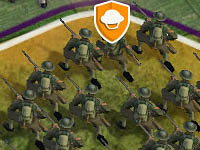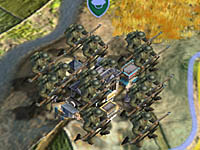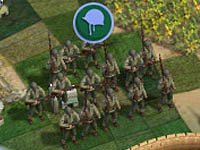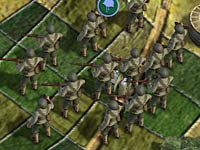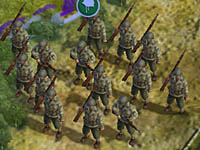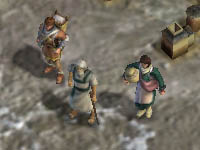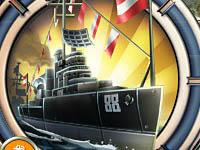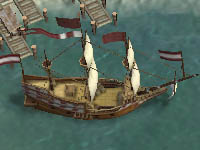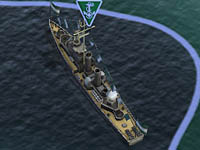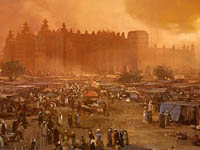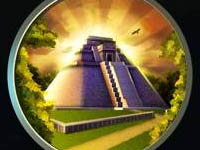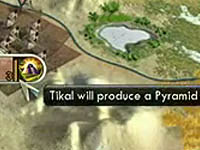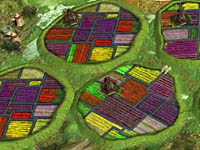 *This page last updated:
08 September, 2014 22:15
PST. (Log of recent changes)
*This page last updated:
08 September, 2014 22:15
PST. (Log of recent changes)
Disclaimer: The information listed below was gathered pre-release, and so some
of it is out of date. I will bring it up to date with the released product as
time permits.
CIVILIZATION V: GODS & KINGS Expansion Pack
On February 16, 2K announced an expansion pack for Civilization V, titled "Gods & Kings." It was released on 19 June 2012 (22 June internationally), for a price of USD $29.99. The Lead Designer on the project is Ed Beach, who has previously worked on Civilization III: Conquests, Tropico: Paradise Island, and Battle for Middle-Earth. Ed also designed Here I Stand, a popular board game about the Reformation. (Jon Shafer, Lead Designer on Civ V, left Firaxis in late 2010.) See the official site here.
What's New in Gods & Kings
Religion
Espionage
9 New Civilizations
27 New Units
13 New Buildings, 9 New Wonders & 1 New National Wonder
Enhanced Diplomacy
Revised Technology Tree
New City-State Types and interactions
Combat System Changes
Three New Scenarios
Changes to Existing Units
New Promotions
Revised Social Policies
7 New Resources and New & Changed Improvements
4 New Natural Wonders
Religion
Religion is based on a new resource called Faith, which can be earned by exploring ancient ruins, constructing religious buildings such as Shrines and Cathedrals, building religious Wonders, and through special abilities (like the Celts' ability to earn Faith from forests or through their Pictish Warrior's ability to generate Faith in combat).
Religions can be customized and developed from a simple pantheon to a modern religion by selecting "Beliefs" that offer specific benefits. You choose Beliefs from a pool (of about 50), and they are unique; choosing a Belief makes it unavailable to any other Religions in that game. A religion may accrue up to a total of five Beliefs over time (though the Byzantines have the special ability to unlock a bonus sixth Belief).
A religion starts out as a primitive animist Pantheon, which is available very early in the game when your civilization has accumulated about 10 Faith. The symbol of a Pantheon is a lightning bolt. A Pantheon has a single Belief chosen from a pool of ~20 Pantheon Beliefs, that provides a basic resource or Faith bonus for certain terrain types. Pantheons do not spread beyond your borders. The amount of Faith it takes to found a Pantheon will increase with every Pantheon that has been founded on the whole map.
Once your civilization has accumulated a certain Faith threshold (depending on game speed), you have a chance every turn to generate a Great Prophet. (When the Prophet spawns, it empties your Faith reserve, regardless of how much above the threshold you had built up.) This Prophet can be used to convert your Pantheon into a full-blown Religion. When founding a Religion, you choose one of the 11 available icons and names (you can change the name), and two more Beliefs, called a Founder and Follower Beliefs, each from a separate pool. When you get a second Great Prophet, you can then Enhance your religion, which unlocks two more Belief slots (called 2nd Follower and Enhancer Beliefs).
The 11 available religion icons are: Buddhism, Christianity, Confucianism, Hinduism, Islam, Judaism, Shinto, Sikhism, Taoism, Tengriism, and Zoroastrianism.
There is a cap on how many Religions can be created in one game (looks like half the total number of civilizations). This limit applies only to Religions and not to Pantheons.
 Beliefs
Beliefs
Beliefs are grouped into four categories: Pantheon, Founder, Follower and Enhancer. Pantheon Beliefs offer basic production bonuses for resources and terrain. Founder Beliefs offer bonuses that benefit only the founder of the religion. Follower Beliefs offer city-specific bonuses or special structures that can benefit any city that follows the religion. Enhancer Beliefs give you access to things like cheaper missionaries, allowing you to spread your religion faster. The total number of Beliefs that a mature Religion can have is five. There is also a sixth Bonus Belief, available only to the Byzantines, which can be chosen from all the available Belief types. Once a Belief is chosen, it becomes unique to that religion and cannot be chosen again by a different religion in the same game.
Pantheon Beliefs:
Ancestor Worship: +1 Culture for every Shrine in your civilization
Dance of the Aurora: +1 Faith from Tundra tiles without Forest
Desert Folklore: +1 Faith from Desert tiles
Faith Healers: +30 HP healed per turn if adjacent to a friendly city
Fertility Rites: 10% faster Growth Rate
God of Craftsmen: +1 Production in cities with population of 3+
God of the Open Sky: +1 Culture from Pastures
God of the Sea: +1 Production from Fishing Boats
God of War: Gain Faith if you win a battle within 4 tiles if your city
Goddess of Festivals: +1 Culture and +1 Faith for each Wine and Incense
Goddess of Love: +1 Happiness from cities with population of 6+
Goddess of Protection: +30% increase in city Ranged Combat Strength
Goddess of the Hunt: +1 Food from Hunting Camps
Messenger of the Gods: +2 Science in cities with a Trade Route
Monument to the Gods: +15% Production of Ancient/Classical Wonders
Mother Goddess: (increased food production)
One with Nature: +2 Faith from Natural Wonders
Oral Tradition: +1 Culture from Plantations
Religious Idols: +1 Culture and +1 Faith for each Gold and Silver
Religious Settlements: +15% faster border growth
Sacred Path: +1 Culture from Jungle tiles
Sacred Waters: +1 Happiness from cities on rivers
Stone Circles: +2 Faith from Quarries
Founder Beliefs:
Ceremonial Burial: +1 Happiness for each City following Religion
Church Property: +2 Gold for each City following Religion
Initiation Rites: +100 Gold when each City first converts to this
Religion
Interfaith Dialogue: Gain Science when a Missionary spreads this religion
to cities of other religions
Papal Primacy: +15 to Influence resting point with City-States following this
religion
Peace Loving: +1 Happiness for every 5 followers of this religion in
non-enemy foreign cities
Pilgrimage: +1 Faith for each foreign city following this religion
Tithe: +1 Gold for every 4 followers of this religion
World Church: +1 Culture for every 5 followers of this religion in other
civilizations
Follower Beliefs:
Asceticism: Shrines provide +1 Happiness in Cities with 3 followers
Cathedrals: Use Faith to purchase Cathedrals (+1 Faith, +3 Culture, +1
Happiness, Artist Specialist slot)
Choral Music: Temples provide +2 Culture in Cities with 5 followers
Divine Inspiration: Each World Wonder provides +2 Faith in city
Feed the World: Shrines and Temples provide +1 Food each in city
Guruship: +2 Production if city has a Specialist
Holy Warriors: Use Faith to purchase pre-Industrial land units
Liturgical Drama: Amphitheaters provide +1 Faith in cities with 3
followers
Monasteries: Use Faith to purchase Monasteries (+2 Faith, +2 Culture,
more with Wine or Incense)
Mosques: Use Faith to purchase Mosques (+3 Faith, +2 Culture, +1
Happiness)
Pagodas: Use Faith to purchase Pagodas (+2 Faith, +2 Culture, +2
Happiness)
Peace Gardens: Gardens provide +2 Happiness in city
Religious Art: Hermitage provides +5 Culture in city
Religious Center: Temples provide +2 Happiness in cities with 5 followers
Religious Community: +1% Production for each follower (max +15%)
Swords into Plowshares: 15% faster Growth rate for city if not at war
Enhancer Beliefs:
Defender of the Faith: +20% Combat near friendly Cities that follow this
Religion
Holy Order: Missionaries and Inquisitors cost 30% less Faith
Itinerant Preachers: Religion spreads to cities 30% further away
Just War: +20% Combat near enemy Cities that follow this Religion
Messiah: Prophets 25% stronger and earned with 25% less Faith
Missionary Zeal: Missionary conversion strength +25%
Religious Texts: Religion spreads 34% faster (68% with Printing Press)
Religious Unity: Religion spreads to friendly city-states at double rate
Reliquary: Gain 50 Faith each time a Great Person is expended
 Spreading
Religion
Spreading
Religion
Each citizen of a city is either an atheist or is converted to a Pantheon or Religion individually. If a majority of citizens in a city follow a particular Religion, then that becomes the "majority Religion" and the city is said to follow that religion, and will generate religious "Pressure" that extends 10 hexes and will slowly convert citizens of other cities to that religion. Majority religion is indicated by an icon on the city bar (see image at right), and mousing over this icon brings up a tooltip that identifies how many citizens follow each religion in the city, how much religious "Pressure" is exerted by each religion, and whether or not this city is the "Holy City" for a given religion. The Holy City is the city (usually the capital) in which the first Great Prophet founded the religion, and it appears to generate additional Pressure. Ed Beach: "If you, as a founder of a religion, have your Holy City captured, you will lose the Founder benefit. That being said, the conqueror does not gain those benefits, they just cease to exist until you’re able to recapture your Holy City."
Pantheons do not generate religious Pressure, and will not spread beyond your borders. It's not clear how Pantheons spread (if at all) within your civilization; it may be that each of your cities automatically gets 1 or 2 followers of the Pantheon and that's it. These Pantheon followers still remain in your cities when the Pantheon is transformed into a Religion; presumably they are converted by religious pressure over time to the new Religion.
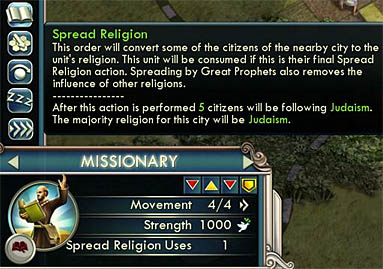 Religions
can spread on their own from one city to another within 10 hexes (without regard
to national borders), converting one citizen at a time depending upon existing
religious pressure. Missionary
units can be used to accelerate this process. Inquisitors can be used to "stamp out" a competing
religion from a city (called "Remove Heresy"), or can be used
passively to prevent the spread of religion to the city in which they are
stationed. The costs of both Missionaries and Inquisitors increases with each
Era, so the best time to spread
your religion is early in the game.
Religions
can spread on their own from one city to another within 10 hexes (without regard
to national borders), converting one citizen at a time depending upon existing
religious pressure. Missionary
units can be used to accelerate this process. Inquisitors can be used to "stamp out" a competing
religion from a city (called "Remove Heresy"), or can be used
passively to prevent the spread of religion to the city in which they are
stationed. The costs of both Missionaries and Inquisitors increases with each
Era, so the best time to spread
your religion is early in the game.
Ed Beach: "The Inquisitors are kind of the anti-Missionaries, where instead of adding religious Pressure to a City, they take it away; but in this case you're taking it away from those other civilizations who are trying to push that religion onto you."
Missionaries have multiple uses before they are expended; an Inquisitor can only be used once. Great Prophets can also be used both to Spread Religion and to stamp it out. Prophets can also build a special Holy Site tile improvement.
In addition to purchasing Beliefs, Faith can be used to purchase unique buildings (like Cathedrals) and units (like Missionaries) that are otherwise unavailable, or to purchase normal Great People (with the appropriate Social Policy for the desired Great Person type: Order for Great Engineer, Autocracy for Great General or Great Admiral, Freedom for Great Artist, Rationalism for Great Scientist, and Commerce for Great Merchant). Rival civilizations will now consider your religion during diplomatic negotiations. During the Middle Ages and Renaissance, these diplomatic modifiers will increase. During the Industrial and Modern eras, these modifiers will decrease. Spreading religion in another civilization's cities will be unwelcome if that civilization has founded a religion of its own, and will incur a diplomatic penalty (especially if you are requested to stop and refuse).
Espionage
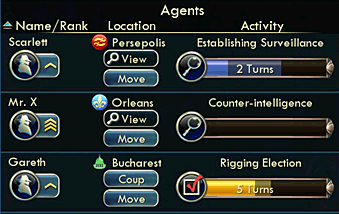 A
Spy is gained at
the beginning of each new era, starting with the Renaissance. Spies can gather
information on foreign cities, steal technology, learn enemy war plans, perform
counter-intelligence missions, and affect influence with City-States by rigging
elections or staging coups. Espionage is conducted entirely through menus; Spies
are not actual units that appear on the map. There are three spy ranks: Recruit,
Agent, and Special Agent. Each subsequent level makes the spy more effective. A
higher ranking spy will steal technologies faster, discover and kill enemy spies
that are trying to steal from you more frequently, rig elections in City-States
more effectively, and have a greater chance of pulling off a coup in a
City-State allied with another civilization. Spies level up when they
successfully steal technology from another civilization or kill an enemy spy
attempting to steal their technology. If a Spy is killed, you will have to wait
a set number of turns before receiving a replacement, who will be at Recruit
experience level.
A
Spy is gained at
the beginning of each new era, starting with the Renaissance. Spies can gather
information on foreign cities, steal technology, learn enemy war plans, perform
counter-intelligence missions, and affect influence with City-States by rigging
elections or staging coups. Espionage is conducted entirely through menus; Spies
are not actual units that appear on the map. There are three spy ranks: Recruit,
Agent, and Special Agent. Each subsequent level makes the spy more effective. A
higher ranking spy will steal technologies faster, discover and kill enemy spies
that are trying to steal from you more frequently, rig elections in City-States
more effectively, and have a greater chance of pulling off a coup in a
City-State allied with another civilization. Spies level up when they
successfully steal technology from another civilization or kill an enemy spy
attempting to steal their technology. If a Spy is killed, you will have to wait
a set number of turns before receiving a replacement, who will be at Recruit
experience level.
A Spy can slowly affect City-State influence over time (increasing your influence and decreasing others') by rigging elections (which occur in each City-State every 12 turns), which appears to be relatively safe but time-consuming. Alternatively, the Spy can try to trigger a coup, which affects influence immediately, but runs the risk of the Spy being caught and executed and incurring a severe influence penalty.
The first civilization to reach the Renaissance Era unlocks Espionage for all players on the map, awarding each player with one Spy to begin with. England receives a bonus Spy. You are also awarded with an additional Spy when you build the National Intelligence Agency (which is a National Wonder).

Cities are rated as targets for Espionage by a "Potential" rating. Ed Beach: "Potential is calculated based on the Science output of the city (obviously, higher is better), as well as the defensive buildings contained in the city, which can slow down a spy quite a bit. Once you’ve established ’Surveillance‘ in an opponent’s city, the potential will be displayed, so you can make a more educated decision about staying, or redeploying somewhere better." From the tooltip on Potential: "You always know the potential of your own cities. If you are in the lead technologically, you should consider protecting your high Potential cities. There are two ways to do this. You may move your own spies to your cities to act as counterspies that have a chance to catch and kill enemies spies before they steal a technology. You may also slow down how quickly enemy spies can steal technologies by constructing buildings like the Constabulary, Police Station, and the Great Firewall."
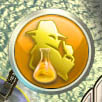 From
the tooltip for the button to Move a Spy: "When a spy is directed to move to a
new city, it takes a number of turns before it becomes fully effective. If the
spy is moving to its owner's city, it will begin counter-espionage to uncover
and kill enemy spies. If a spy is moved to a city that is owned by another
civilization, the spy will begin trying to steal technology from that
civilization. A spy can only steal from a civilization that knows any technology
that the spy's owner does not. If the owner of the city has a spy defending the
city, your spy has a chance of being discovered and killed. This may strain
diplomatic relations! If the spy moves to a city that is a City-State, the spy
will attempt to rig the elections to increase your influence over the
city-state."
From
the tooltip for the button to Move a Spy: "When a spy is directed to move to a
new city, it takes a number of turns before it becomes fully effective. If the
spy is moving to its owner's city, it will begin counter-espionage to uncover
and kill enemy spies. If a spy is moved to a city that is owned by another
civilization, the spy will begin trying to steal technology from that
civilization. A spy can only steal from a civilization that knows any technology
that the spy's owner does not. If the owner of the city has a spy defending the
city, your spy has a chance of being discovered and killed. This may strain
diplomatic relations! If the spy moves to a city that is a City-State, the spy
will attempt to rig the elections to increase your influence over the
city-state."
New Civilizations
9 New playable Civilizations. In addition, it has been confirmed that Spain (which was previously released as part of a DLC) is also being included in the expansion.
| Civilization | Icon | Leader | Capital | Unique Unit | Unique U/B/I | Special Ability |
| Austria |
|
Maria Theresa | Vienna | Hussar | Coffee House | Diplomatic Marriage |
| Byzantium |
|
Theodora | Constantinople | Dromon | Cataphract | Patriarchate of Constantinople |
| Carthage |
|
Dido | Carthage | African Forest Elephant | Quinquereme | Phoenician Heritage |
| Celts |
|
Boudicca | Edinburgh | Pictish Warrior | Ceilidh Hall | Druidic Lore |
| Ethiopia |
|
Haile Selassie | Addis Ababa | Mehal Safari | Stele | Spirit of Adwa |
| Huns |
|
Attila | Attila's Court | Battering Ram | Horse Archer | Scourge of God |
| Mayans |
|
Pacal the Great | Palenque | Atlatlist | Pyramid | The Long Count |
| Netherlands |
|
William I of Orange | Amsterdam | Sea Beggar | Polder | Dutch East India Company |
| Sweden |
|
Gustavus Adolphus | Stockholm | Hakkapeliitta | Carolean | Nobel Prize |
| Spain |
|
Isabella | Madrid | Conquistador | Tercio | Seven Cities of Gold |
Special Abilities
- Diplomatic Marriage (Austria): Can spend Gold to annex or puppet an allied City-State.
- Patriarchate of Constantinople (Byzantium): Choose one more Belief than normal when you found a Religion.
- Phoenician Heritage (Carthage): All coastal Cities get a free Harbor. Units may cross mountains after the first Great General is earned, taking 50 HP damage if they end a turn on a mountain.
- Druidic Lore (Celts): +1 Faith per city with an adjacent unimproved Forest. Bonus increases to +2 Faith in Cities with 3 more more adjacent unimproved Forest tiles.
- Spirit of Adwa (Ethiopia): Combat bonus (+20%) when fighting units from a Civilization with more Cities than Ethiopia.
- Scourge of God (Huns): Raze cities at double-speed. Borrow City names from other in-game Civs. Start with Animal Husbandry technology. +1 Production from Pasture.
- The Long Count (Maya): After researching Theology, receive a bonus great person at the end of every Maya calendar cycle ( 394 years ).
- Dutch East India Company (Netherlands): Retains 50% of the happiness benefits from a luxury resource if your last copy of it is traded away.
- Nobel Prize (Sweden): Gain 90 Influence with a Great Person gift to a City-State. When declaring friendship, Sweden and their friend gets a +10% boost to Great Person generation.
- Seven Cities of Gold (Spain): Gold bonus for discovering a Natural Wonder (bonus enhanced if first to discover it). Culture, happiness, and tile yields from Natural Wonders doubled.
Changes to Existing Civilizations
England: Sun Never Sets changed to: "+2 Movement for all naval
units. Receives 1 extra Spy."
Ottomans: Barbary Corsairs changed to: "All melee naval units have the
Prize Ships promotion, allowing them to capture defeated ships. Pay only
one-third the usual cost for naval unit maintenance."
Siam: Father Governs Children changed to: "Food, Culture and Faith from
friendly City-States increased by 50%.
Songhai: River Warlord changed to: "Receive triple Gold from Barbarian
encampments and pillaging Cities. Land units gain the War Canoe and Amphibious
promotions, strengthening them while embarked."
Enhanced Diplomacy
Foreign civilizations will now consider your Religion and the Social Policies you've chosen when deciding whether or not to like you. Religion will be more important early in the game; the diplomatic modifiers for Religion will increase during the Medieval and Renaissance ages, but will then decrease thereafter. After the Renaissance period, the major impact on diplomacy will be which of the Industrial-era Social Policy trees you've chosen: Freedom, Autocracy or Order.
Information obtained through Espionage can also be used in the Diplomacy system (such as informing a friendly civilization that another civilization plans to attack them). Diplomatic deals can now be renewed (or renegotiated) instead of simply ending after a certain number of turns.
You can once again found Embassies with other civilizations. Embassies allow visibility of the other civilization's capital, and are required for Defensive Pacts and Open Borders agreements. Going to war will dissolve an embassy.
The negative diplomatic modifier for "trying to win the game the same way as us" has been removed. Diplomatic modifiers are now color-coded according to how severe (or beneficial) the effect is.
Revised Technology Tree
The tech tree has changed. The Classical era has been expanded to 2 tiers, and the post-Industrial eras have been expanded into: Modern, Atomic, and Information eras. There are 8 new technologies.
Below is the full Gods & Kings technology tree. Items new to Gods & Kings are annotated.
Click on the image
for a full-size version.

(Compare with the pre-expansion tree
here.)
New Technologies
 Drama and Poetry
Drama and Poetry
Era: Classical
Cost: 175
Requires: Writing
Leads to: Theology, Civil Service
Unlocks: National Epic and Amphitheatre.
 Guilds
Guilds
Era: Medieval
Cost: 275
Requires: Currency
Leads to: Chivalry, Machinery
Unlocks: National Treasury, Machu Picchu, Trading Post, Polder, Wealth
 Architecture
Architecture
Era: Renaissance
Cost: 1150
Requires: Banking, Acoustics
Leads to: Archaeology, Scientific Theory
Unlocks: Hermitage, Porcelain Tower, Taj Mahal
 Industrialization
Industrialization
Era: Industrial
Cost: 1600
Requires: Economics
Leads to: Steam Power
Unlocks: Gatling Gun, Factory, Big Ben, reveal Coal
 Ballistics
Ballistics
Era: Modern
Cost: 4100
Requires: Flight
Leads to: Radar, Combined Arms
Unlocks: Anti-Aircraft Gun and Machine Gun
 Combined Arms
Combined Arms
Era: Atomic
Cost: 5100
Requires: Combustion, Ballistics
Leads to: Computers
Unlocks: Tank, Anti-Tank Gun, Pentagon
 Mobile Tactics
Mobile Tactics
Era: Information
Cost: 7700
Requires: Ecology, Nuclear Fission
Leads to: Particle Physics
Unlocks: Mechanized Infantry
 Telecommunications
Telecommunications
Era: Information
Cost: 7700
Requires: Ecology
Leads to: Globalization, Particle Physics
Unlocks: Nuclear Submarine, Bomb Shelter, CN Tower
Changes to Existing Technologies
Pottery: now also unlocks Shrine.
Trapping: no longer unlocks Trading Post.
Optics: now also unlocks Great Lighthouse (instead of at Sailing).
Horseback Riding: now also unlocks Circus Maximus (instead of at
Construction).
Construction: now also unlocks Composite Bowman and
Terracotta Army, but no longer Circus Maximus or Great Wall
Philosophy: no longer unlocks National Epic or Research Agreements.
Currency: now also unlocks Petra wonder.
Engineering: now also unlocks Great Wall.
Iron Working: now also unlocks Colossus (instead of at Bronze Working).
Theology: now unlocks Garden, Hagia Sophia, and Great Mosque of Djenne.
Civil Service: now also unlocks Research Agreements (instead of at Philosophy).
Compass: Now also unlocks Galleass.
Education: Now unlocks University, Oxford, Angkor Wat, Research, and an unknown
ability.
Chivalry: now unlocks Alhambra wonder instead of Himeji Castle.
Physics: now also unlocks Notre Dame.
Machinery: no longer unlocks Armory.
Acoustics: no longer unlocks Hermitage or The Kremlin.
Banking: now also unlocks Constabulary.
Navigation: now also unlocks Privateer.
Rifling: no longer unlocks Arsenal.
Railroad: now unlocks an additional ability.
Economics: now unlocks Coffee House for Austria (replacement unknown) and
2 new abilities instead of Windmill and Big Ben.
Fertilizer: now unlocks an additional ability.
Steam Power: no longer unlocks Factory.
Electricity: now unlocks Hydro Plant and Police Station.
Replaceable Parts: now unlocks the WWI version of Infantry and the
Military Base, but no longer the Anti-Tank gun.
Refrigeration: now unlocks Stadium.
Flight: now unlocks WWI
Fighter and WWI Bomber instead of Fighter and Carrier, and an unknown ability.
Combustion: now unlocks WWI Tank/Land Ship instead of Tank.
Atomic Theory: now unlocks an additional ability.
Penicillin: now also unlocks Marine.
 New City-State Types
New City-State Types
New types include Religious City-States which provide Faith, and Mercantile City-States that provide a Happiness bonus and unique luxury resources such as Jewelry and Porcelain. The Influence system has changed, providing more quests (up to three per City-State at one time), and reducing the effectiveness of cash gifts. There are new quest types such as "generate the most Faith in 20 turns." The UI for the Influence meter on the city bar has changed, and now displays the four distinct stages of Influence in one meter. At right, Antwerp is an example of a Mercantile city-state, and below right, Jerusalem is an example of a Religious city-state. A helpful "Find on Map" button has also been added. to the UI.
 City-States
will no longer request that you conquer a rival; instead you may now "Bully" or
demand tribute from a City-State. By moving a military force close to a
City-State's borders, you can intimidate them (the icon will turn orange) and
you will unlock the option to "Ask For Tribute", in which you can demand gold or
a worker, with appropriate Influence penalties. Bullying a City-State will
reduce your Influence and cause that City-State to cancel any available quests
that it has offered you, and may incur diplomatic penalties with any
civilization that has pledged protection to that City-State.
City-States
will no longer request that you conquer a rival; instead you may now "Bully" or
demand tribute from a City-State. By moving a military force close to a
City-State's borders, you can intimidate them (the icon will turn orange) and
you will unlock the option to "Ask For Tribute", in which you can demand gold or
a worker, with appropriate Influence penalties. Bullying a City-State will
reduce your Influence and cause that City-State to cancel any available quests
that it has offered you, and may incur diplomatic penalties with any
civilization that has pledged protection to that City-State.
Mercantile City-States: Antwerp, Cahokia, Colombo, Genoa, Hong Kong, Marrakech, Singapore, Tyre, Zanzibar,
Zurich
Religious City-States: Geneva, Jerusalem, La Venta, Lhasa, Vatican
City, Wittenburg
Other new City-States: Jakarta (Maritime), Lisbon (Maritime), Prague (Cultured),
Manila (Maritime), Milan (Cultured), Mombasa (Maritime),Valetta (Military),
Yerevan (Cultured)
Combat Changes
- Units have more health and so may last longer in combat (health has been increased from 10 to 100). According to Ed Beach: "In Civilization V, one unit could kill another unit of the same strength with about two hits (roughly 4-8 damage per hit). Under the new 100 point system, it would take approximately 3-4 hits (at around 24-36 damage per hit)." Accordingly, the mechanics of combat have changed significantly, and the Combat Strengths of many existing units have been changed. Healing rates have increased x10.
- There are now "melee" naval units that attack by ramming or boarding enemy units at close range. Melee naval units can attack other naval units and coastal cities, but NOT land units on the coast. They also get promotions that allow them to pillage gold while attacking cities. The Trireme is now a melee unit. The Destroyer is now a melee unit; the Battleship is still ranged. The Caravel is now a melee unit, and upgrades to the Ironclad, which is also melee.
- Embarked land units now have "Defensive Embarkation," which allows them to defend themselves when attacked via melee, and can stack with a naval unit for protection. There is also a new Great Admiral unit that can heal nearby friendly naval units.
- There are three new ranged units to fill the gaps in the various eras, so that you no longer have to upgrade
Crossbowmen to Riflemen (making their ranged promotions useless). The new
ranged upgrade progression goes:
Archer -> Composite Bowman -> Crossbowman -> Gatling Gun -> Machine Gun. - Units can still heal themselves in lieu of a promotion, but this instant heal can now only be 50% of their maximum health.
- There is no longer a "Garrison" command; any unit in a city is automatically considered garrisoned, and may take normal actions without giving up the Garrison defensive bonus to the city.
New Scenarios
Three new original scenarios are included.
Fall of Rome
Play as either Eastern Rome or Western Rome trying to fend off the barbarians OR as one of the barbarians themselves. Eastern and Western Rome have to select Social Policies that actually have negative effects, so they will get weaker over time.
Into the Renaissance
Grow your medieval kingdom into one of the great nations of Renaissance Europe, fending off outside invasions from Mongols and Ottoman Turks and fighting the religious wars of the Crusades and Reformation!
Empires of the Smoky Skies
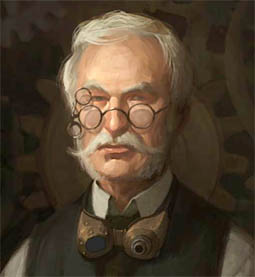 Build flying airships and huge landship steam tanks from the unique tech tree
of this Victorian science-fiction scenario, and use them to spread your empire
across the pre-industrial world. The scenario starts at the beginning of the
Industrial Era, and requires the player to hold 3 of 5 Honourable Titles awarded
by the League of Empires for five consecutive turns.
Build flying airships and huge landship steam tanks from the unique tech tree
of this Victorian science-fiction scenario, and use them to spread your empire
across the pre-industrial world. The scenario starts at the beginning of the
Industrial Era, and requires the player to hold 3 of 5 Honourable Titles awarded
by the League of Empires for five consecutive turns.
- Five civilizations: Eruch (Cyrus Rotheram), Vedria (Luther Griggs), Orlin (Ignace Curlin), Pulias (Octavius Cutler) and Dalmace (Clinton Alderdice).
- Custom buildings, new resources, new units
- Steam Era and Airship Era
Victory Conditions: Empires compete in five categories; be the best in a domain to earn an Honourable Title. To see the specifics of each Title, and monitor your progress, check the League of Empires screen. The first empire to hold three or more Titles will control the League and win the game.
- Defender of Progress: have the most land and airships
- Grand Philanthropist: have the most world and national wonders
- Captain of Industry: have the highest production
- Lord of Refinement: have the most social policies
- Master of Wealth: have the highest total gross gold income
Special Rules: Players begin with all technologies up through Steam Power. The tech tree after Steam Power has been altered significantly, giving players the ability to construct Airships, Landships, and new buildings. Barbarians ("Luddites") are enabled, but do not have access to advanced units. Social Policies have been rearranged. Religion has been disabled, as have religious and military city-states.
New Units
There are 27 new units in the expansion. The following list has 28 entries; the Infantry unit has been split into WWI and WWII versions, but this is counted as only one "new" unit. Note that the Cost numbers listed below may be out of whack, because we don't know what game speed settings the various screenshots and videos are using.
| Unit | Type | Technology | Cost | Moves | Str. | Ranged Str. |
Range | Required Resource | Notes |
| Atlatlist | Archery | Archery | 36 | 2 | 5 | 7 | 2 | none | Mayan UU* |
| Pictish Warrior | Melee | Bronze Working | 56 | 2 | 11 | - | - | none | Celtic UU*; +Faith per kill, free pillage, combat bonus outside borders |
| Battering Ram | Siege | Bronze Working | 75 | 2 | 10 | - | - | none | Hun UU*; +300% vs cities, -1 sight, -33% on defense |
| Horse Archer | Mounted | The Wheel | 56 | 4 | 6 | 8 | 2 | none | Hun UU*; Accuracy I |
| Quinquereme | Naval Melee | Sailing | 45 | 4 | 13 | - | - | none | Carthage UU*; coast only |
| Dromon | Naval Ranged | Sailing | 56 | 4 | 8 | 10 | 2 | none | Byzantine UU*; +50% vs naval, coast only |
| African Forest Elephant | Mounted | Horseback Riding | 100 | 3 | 14 | - | - | none | Carthage UU*; causes fear, +Great General points |
| Composite Bowman | Archery | Construction | 75 | 2 | 7 | 11 | 2 | none | May Not Melee Attack |
| Cataphract | Mounted | Horseback Riding | 75 | 3 | 15 | - | - | Horses | Byzantine UU* |
| Galleass | Naval Ranged | Compass | 100 | 3 | 16 | 17 | 2 | none | Cannot Enter Deep Ocean |
| Privateer | Naval Melee | Navigation | 150 | 5 | 25 | - | - | none | Coastal Raider I, Prize Ships |
| Sea Beggar | Naval Melee | Navigation | 150 | 5 | 25 | - | - | none | Dutch UU*; Coastal Raider II, Supply |
| Hakkapeliitta | Mounted | Metallurgy | 185 | 4 | 25 | - | - | Horses | Swedish UU*; Formation I, Can Move After Attacking, Movement with General |
| Carolean | Gunpowder | Rifling | 225 | 2 | 34 | - | - | none | Swedish UU*; March |
| Hussar | Mounted | Military Science | 225 | 5 | 34 | - | - | Horses | Austrian UU*; +1 Sight, +50% Flanking, Can Move After Attacking, -33% vs cities |
| Gatling Gun | Archery | Industrialization | 225 | 2 | 36 | 36 | 1 | none | May Not Melee Attack |
| Mehal Sefari | Gunpowder | Gunpowder | 200 | 2 | 34 | - | - | none | Ethiopian UU*; Drill I, Near Capital Bonus |
| Machine Gun | Archery | Ballistics | 350 | 2 | 60 | 60 | 1 | none | May Note Melee Attack |
| Triplane | Air | Flight | 325 | - | - | 35 | 5 | Oil | Interception (50), Air Sweep, Air Recon, +150% vs Bombers and Helicopters |
| WWI Bomber | Air | Flight | 325 | - | - | 50 | 6 | Oil | |
| WWI Infantry | Gunpowder | Replaceable Parts | 320 | 2 | 50 | - | - | none | |
| WWI Tank | Armor | Combustion | 350 | 4 | 60 | - | - | Oil | |
| Infantry | Gunpowder | Plastics | 375 | 2 | 70 | - | - | none | |
| Marine | Gunpowder | Penicillin | 400 | 2 | 65 | - | - | none | Amphibious, +1 Sight When Embarked, Double Embarked Defense |
| Great Prophet | Civilian | - | - | 2 | 2000 | - | - | - | Found Religion, Spread Religion, Build Holy Site |
| Great Admiral | Civilian | - | - | ? | 0 | - | - | - | +15% combat bonus, can heal nearby naval units |
| Missionary | Civilian | - | 200† | 4 | 1000 | - | - | - | Spread Religion |
| Inquisitor | Civilian | - | 200† | 3 | 0 | - | - | - | Remove Heresy |
(*UU - "Unique Unit"; a civilization-specific unit) († - purchased with Faith)
Atlatlist
Movement: 2; Strength: 5; Ranged Attack: 7; Range: 2 Cost: 36 hammers or 72
faith; Requires Resource: none
Technology: Agriculture; Obsolete with: Construction; Upgrades to:
Composite Bowman
Abilities: May Not Melee Attack
Game Info: Only the Maya may build this unit. It is cheaper and available
sooner than the Archer, which it
replaces.
Notes: Mayan Unique Unit; replaces Archer. It has the same stats as the Archer,
but is available immediately and is cheaper. The atlatl is a javelin-thrower,
a stick acting as a lever to amply the force used to throw the javelin.
Pictish Warrior
Movement: 2; Strength: 11; Ranged Strength: 0; Cost: 56; Requires Resource:
none
Technology: Bronze Working
Abilities: Combat bonus outside of friendly territory, can pillage at no
additional movement cost, and earn 50 percent of enemy combat strength as faith
for kills
Special Abilities: A Celtic Unique Unit; it has a combat bonus outside of
friendly territory and can pillage enemy improvements at no additional movement
cost. Earns 50% of opponents’ strength as Faith for kills.
Notes: The Picts were Celts living in Scotland.
Battering Ram
Movement: 2; Strength: 10; Ranged Attack: 0; Cost: 75 Hammers or 150 Faith; Requires Resource:
none
Technology: Bronze Working; Obsolete with: Physics; Upgrades to:
Trebuchet
Abilities: Cover I, +300% bonus vs. Cities, -1 Visibility, No Defensive
Terrain Bonuses, -33% Penalty on Defense
Game Info: Siege unit deadly at melee attacks versus cities. Only the
Huns may build it.
Strategy: Battering Rams are a Hunnic unique unit replacing the Spearman.
Use Battering Rams to knock down the defenses of a city. They have the Cover I
promotion to keep them safe from ranged units; attack them with melee units to
defeat them.
Notes: Hun Unique Unit; replaces Spearman.


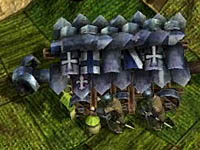

Horse Archer
Movement: 4; Strength: 7; Ranged Attack: 10; Range: 2; Cost: 56; Requires
Resource: none
Technology: The Wheel; Obsolete with: Chivalry; Upgrades to: Knight
Abilities: Accuracy I, May Not Melee Attack
Game Info: A fast Ranged Unit used for hit and run attacks.
Notes: Hun Unique Unit; replaces Chariot Archer. Does NOT require Horses.


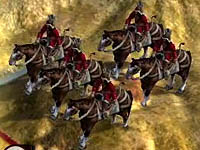

Quinquereme
Movement: 4; Strength: 13; Ranged Attack: 0; Cost: 45; Requires Resource:
none
Technology: Sailing; Obsolete with: Astronomy; Upgrades to: Caravel
Abilities: Cannot Enter Deep Ocean
Game Info: Strong Ancient era Naval Unit used to dominate the seas
through melee attacks on naval units and cities. Only the Carthaginians may
build it.
Notes: Carthaginian Unique Unit, replaces the Trireme. The Quinquereme has a +3
Strength more than the Trireme. The quinquereme had five banks of oars (as opposed to
the trireme's three) and was introduced by the Carthaginians, though later
adopted by the Romans.


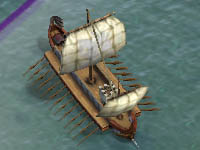

Dromon
Movement: 4; Strength: 8; Ranged Attack: 10; Range: 2; Cost: 56; Requires
Resource: none
Technology: Sailing; Obsolete with: Astronomy; Upgrades to: Galleass
Abilities: +50% vs. Naval, Cannot Enter Deep Ocean, May Not Melee Attack
Game Info: Dominant Ancient Era Naval Unit used to own the seas
through the Classic Era with its ranged attack. Only the Byzantines may build
it.
Strategy: Attacks with lethal Greek Fire, making it the first naval unit
with a ranged attack. This unit fights at +50% strength against other naval
units. It cannot enter Deep Ocean tiles.
Notes: Byzantine Unique Unit, replaces Trireme. The Dromon has a ranged
attack instead of a melee attack. The historical dromon was a Medieval-era oared galley with the
ability to spray Greek Fire from a siphon in the prow.

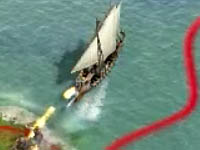

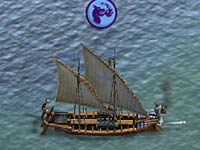
Cataphract
Movement: 3; Strength: 15; Ranged Attack: 0; Cost: 75 hammer or 150 faith;
Requires Resource: Horses
Technology: Horseback Riding; Obsolete with: Chivalry; Upgrades to:
Knight
Abilities: Can Move After Attacking, -25% Penalty vs. Cities
Notes: Byzantine Unique Unit, replaces Horseman. The Cataphract has a +3
Strength more than the Horseman which it replaces. Can gain defensive bonuses
from terrain. Cataphracts were heavy armored cavalry, with both the
rider and horse covered in chain or scale armor, used from the Classical period
through the Middle Ages. Byzantine cataphracts were drawn from the
land-owning middle class, and so were in more ways than one the forerunner of
the European knights.
Composite Bowman
Movement: 2; Strength: 7; Ranged Attack: 11; Cost: 75; Requires Resource:
none
Technology: Construction; Obsolete with: Machinery; Upgrades to: Crossbowman
Abilities: Can't melee attack.
Game Info: Classical ranged infantry unit.
Strategy: The Composite Bowman is more powerful than the Archer. As a Ranged
unit it can deal significant damage to other units up to two hexes away, but it
is vulnerable to melee attacks. Put Composite Bowman in your city for defense,
and guard them with melee units when on the move.
Notes: This is a new intermediate ranged unit between Archer and Crossbowman,
available in the Classical Era with Construction.



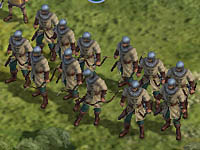
African Forest Elephant
Movement: 3; Strength: 14; Ranged Attack: 0; Cost: 100; Requires Resource:
none
Technology: Horseback Riding; Obsolete with: Chivalry; Upgrades to:
Knight
Abilities: Feared Elephant (-10% penalty to adjacent enemies), Can Move
After Attacking, Great Generals II, No Defensive Terrain Bonuses, -33% Penalty
Attacking Cities
Game Info: Powerful early game Mounted Unit. Weak to Spearmen, This Unit
has a higher Combat Strength (+2) than the Horseman, which it replaces, and
strikes fear into nearby enemy units. Helps produce Great Generals more quickly.
Notes: Carthaginian Unique Unit, replaces Horseman.


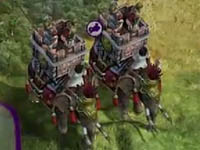
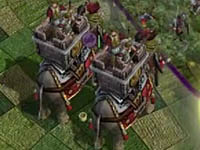
Galleass
Movement: 3; Strength: 16; Ranged Attack: 17; Range: 2; Cost: 100; Requires
Resource: none
Technology: Compass; Obsolete with: Navigation; Upgrades to: Frigate
Abilities: Cannot Enter Deep Ocean, May Not Melee Attack
Game Info: Medieval Era Naval Units used to wrest control of the seas
with its ranged attack.
Notes: The Galleass is the first ranged naval unit, and it upgrades
to Frigate. It is very slow and cannot enter deep ocean, so it is useful only
for combat. The galleass was an intermediate vessel between the oared galley
and the full-sailed galleon.

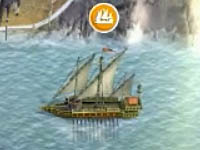

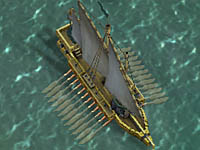
Privateer
Movement: 5; Strength: 25; Ranged Attack: 0; Cost: 150; Requires Resource:
none
Technology: Navigation; Obsolete with: Combustion; Upgrades to: Destroyer
Abilities: Coastal Raider I (+20% vs Cities, steal gold equal to 33% of
the damage done), Prize Ships (defeated naval unit joins your side)
Game Info: Naval unit that specializes in attacking coastal cities to
earn gold and capturing enemy ships.
Notes: The Privateer is a normal unit; it does NOT have hidden
nationality (as in Civ III and IV). The graphic for the Privateer is only
slightly modified from the Frigate, with black bowsprit and spanker sails, and
small pirate flags. Privateers were
legalized pirates, granted "Letters of Marque" to attack enemy shipping during
wartime.



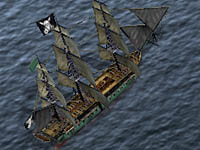
Sea Beggar
Movement: 5; Strength: 25; Ranged Attack: 0; Cost: 150; Requires Resource:
none
Technology: Navigation; Obsolete with: Combustion; Upgrades to: Destroyer
Abilities: Coastal Raider I and II, Prize Ships, Supply (heal +15 per
turn outside friendly borders)
Game Info: A Dutch Unique Unit; specializes in attacking coastal cities
to earn gold, and capturing enemy ships.
Notes: Netherlands unique unit; replaces Privateer. The "Sea Beggars" were Dutch privateers who, under William of Orange, fought
against their Spanish overlords.


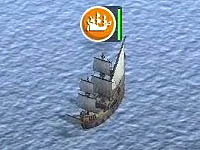
Hakkapeliitta
Movement: 4; Strength: 25; Ranged Attack: 0; Cost: 185 for 370 Faith; Requires Resource:
Horses
Technology: Metallurgy; Obsolete with: Combined Arms; Upgrades to:
Anti-Tank Gun
Abilities: Formation I, Can Move After Attacking, Transfer Movement to
General, Great General Combat Bonus, No Defensive Terrain Bonuses, -25% Penalty
vs. Cities
Game Info: Elite mounted Unit that specializes in working with Great
Generals. Only the Swedish may build it.
Strategy: Hakkapeliitta are the elite mounted units of the late
Renaissance Swedish army. Stack a Great General with them if possible. The Great
General receives the movement allowance of the Hakkapeliitta if they start the
turn stacks. In addition, the Hakkapeliitta receive a 15% combat bonus when
stacked with a Great General.
Notes: Swedish Unique Unit; replacement for Lancers. The hakkapeliitta was a
Finnish light cavalry fighting for King Gustavus Adolphus of Sweden during the
Thirty Years' War (1618 to 1648).



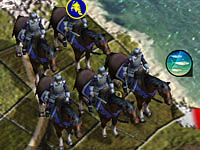
Carolean
Movement: 2; Strength: 34; Ranged Attack: 0; Cost: 225; Requires Resource:
none
Technology: Rifling; Obsolete with Replaceable Parts; Upgrades to: Great
War Infantry
Abilities: March
Game Info: A Swedish Unique Unit; starts with the March promotion that
allows it to Heal every turn, even if it performs an action.
Notes: Swedish Unique Unit; replaces Rifleman. The Caroleans were Swedish infantry of
the late Seventeenth and early Eighteenth centuries under Charles XI and XII,
famous for their strict discipline and courage under fire.

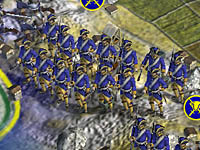


Hussar
Movement: 5; Strength: 34; Ranged Attack: 0; Cost: 225; Requires Resource:
Horses
Technology: Military Science; Obsolete with: Combustion; Upgrades to:
Landship
Abilities: +1 Sight, +50% Flank Attack, Can Move After Attacking, No
Defensive Terrain Bonuses, -33% Penalty vs. Cities
Game Info: An Austrian Unique Unit; a fast Mounted Unit used for
scouting and hit-and-run attacks. Especially deadly with flank attacks.
Notes: Austrian Unique Unit; replaces Cavalry. Bonus on Flank Attacks.

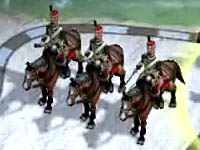
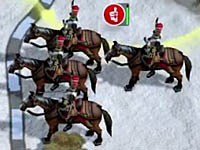

Gatling Gun
Movement: 2; Strength: 36; Ranged Attack: 36; Range: 1; Cost: 225; Requires
Resource: none
Technology: Industrialization; Obsolete with: Ballistics; Upgrades to: Machine
Gun
Abilities: May Not Melee Attack
Game Info: Ranged Infantry Unit of the mid-game that must be adjacent to an
enemy unit to strike.
Notes: Crossbows now can be upgraded to the Gatling Gun, which in turn upgrades
to the Machine Gun. The Gatling was a hand-cranked multiple-barreled rotary gun
first introduced in the American Civil War.
Mehal Sefari
Movement: 2; Strength: 34; Ranged Attack: 0; Cost: 200; Requires Resource:
none
Technology: Rifling; Obsolete with: Replaceable Parts; Upgrades to: Great
War Infantry
Abilities: Drill I, Near Capital Bonus (30% stronger near the capital;
bonus falls off as the unit move farther away)
Game Info: An Ethiopian Unique Unit; specializes in fighting in rough
terrain and defending near the Ethiopian capital.
Notes: Ethiopian Unique Unit, replaces Rifleman. The Mehal Sefari were elite units of the Ethiopian Imperial Guard during the
late Nineteenth Century.
Machine Gun
Movement: 2; Strength: 60; Ranged Attack: 60; Range: 1; Cost: 350; Requires
Resource: none
Technology: Ballistics; Obsolete with: never; Upgrades to: Mechanized
Infantry
Abilities: May Not Melee Attack
Notes: Based on the deadly Maxim gun, invented in 1884 and used to devastating effect
by both sides in World War I.
Triplane
Ranged Attack: 35; Range: 5; Cost: 325; Requires Resource: Oil
Technology: Flight; Obsolete with: Radar; Upgrades to: Fighter
Abilities: Interception (50), Air Sweep, Air Recon, +150% vs. Bombers and
Helicopters
Game Info: Early Air Unit designed to intercept enemy aircraft.
Strategy: The Triplane can be based in any city you own or aboard an
aircraft carrier. It can move from city to city (or carrier) and perform
"missions" within its range of 5 tiles. Use triplanes to attack enemy aircraft
and ground units, to scout enemy position, and to defend against enemy air
attacks.
Notes: Flight now gives access to WWI-era aircraft. Appearance based on the German Fokker Dr.1 Triplane.

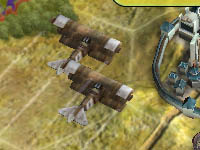

Great War Bomber
Ranged Attack: 50; Range: 6; Cost: 325; Requires Resource: Oil
Technology: Flight; Obsolete with: Radar; Upgrades to: Bomber
Abilities: none
Notes: Flight now gives access to WWI-era aircraft. Appears to be based on the German Gotha bomber.
In some shots it is named "WWI Bomber," but in others it is named "Great War
Bomber."
Landship
Movement: 4; Strength: 60; Ranged Attack: 0; Cost: 350; Requires Resource:
Oil
Technology: Combustion; Obsolete with: Combined Arms; Upgrades to: Tank
Abilities: Can move after attacking, No Defensive Terrain Bonuses
Notes: Combustion now gives access to a WWI-era armored unit instead of the
WWII-era Tank. Looks like a British Mk.IV or Mk.V tank.
Great War Infantry
Movement: 2; Strength: 50; Ranged Attack: 0; Cost: 320; Requires Resource: none
Technology: Replaceable Parts; Obsolete with: Plastics; Upgrades to:
Infantry
Abilities: none
Notes: The old Civ V Infantry unit now has a different icon, and is a
WWI-era unit.
Infantry
Movement: 2; Strength: 70; Ranged Attack: 0; Cost: 375; Requires Resource: none
Technology: Plastics; Obsolete with: Mobile Tactics; Upgrades to: Mechanized
Infantry
Notes: The Civ V icon for Infantry now is on a unit with a graphic that
looks like US WWII infantry. It has moved to Plastics.
Marine
Movement: 2; Strength: 65; Ranged Attack: 0; Cost: 400; Requires Resource:
none
Technology: Penicillin; Obsolete with: never
Abilities: Amphibious, Extra Sight When Embarked, Embarkation With Defense
(defend at double strength)
Game Info: Atomic Era Unit especially useful for embarking and invading across
the sea.
Notes: Dennis Shirk confirmed in a PAX interview that there is a "late-game
Marine unit."


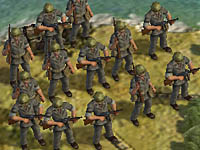
Great Prophet
Movement: 2; Religious Strength: 2000; Cost: n/a; Requires Resource: none
Abilities: Found Religion, Enhance Religion, Build Holy Site, Spread Religion
(limited to 4 actions)
Notes: A new Great Person type that can be used to found a Religion or add
Beliefs to a Religion. Can create a "Holy Site" tile improvement. Appears to be
able to spread religion a limited number of times. Has a "Religious
Strength" value which is related to the ability to spread religion. When
used to spread religion, Great Prophets also remove competing religions, even in
a foreign city. If you use any of your Spread Religion actions, the Prophet
loses the ability to Build Holy Site or Enhance Religion.
Great Admiral
Movement: 6; Strength: -; Ranged Attack: -; Cost: -; Requires Resource: -
Notes: The Great Admiral can stack with combat naval units for protection. "The Great Admiral has the ability to instantly repair every naval and
embarked unit in the same hex, as well as in adjacent hexes. The Great Admiral
is consumed when performing this action. The Great Admiral also provides a 15%
combat bonus to all player-owned naval units within 2 tiles. The Great Admiral
is NOT consumed when he provides this bonus."
Missionary
Movement: 4; Religious Strength: 1000; Ranged Attack: -; Cost: 200 Faith;
Requires Resource: none
Special Abilities: -1 Visibility, Spread Religion: This order will covert
some of the citizens of the nearby city to the unit's religion. This unit will
be consumed if this is their final Spread Religion action. Spreading by Great
Prophets also removes the influence of other religions." Unwelcome Evangelist:
"Can enter rival territory without Open Borders but loses 25% of original
religious strength for each turn they end on such a tile. Unit in eliminated
when religious strength reaches 0."
Game Info: Used to spread religion to cities. May only be obtained by
purchasing with Faith.
Strategy: Can be purchased with Faith in any city with a majority
religion. Once adjacent to a city they can spread their religion to it
(expending the Missionary after the second use).
Notes: A new unit that can be used to spread Religion, to your own cities
or foreign cities (including City-States). It is purchased only with
Faith, and the cost increases every Era. The Missionary has 2 Spread Religion
actions, after which it is consumed. Missionaries can be captured in combat, but
they retain their religious affiliation, so don't try to use them to Spread
Religion, because they will spread the religion of the enemy.




Inquisitor
Movement: 3; Strength: 0; Cost: 200 Faith; Requires
Resource: none
Special Abilities: +1 Sight, Remove Heresy: "This order will remove the
presence of other religions from the nearby, friendly-controlled city. An
inquisitor is consumed by this action."
Game Info: Used to remove other religions from Cities. May only be
obtained by purchasing with Faith.
Strategy: Can be purchased with Faith with a majority Religion that has
been enhanced. They can remove other religions from your cities (expending the
Inquisitor) or be placed inside a city to protect it from Missionaries and
Prophets trying to spread other religions to that city.
Notes: Inquisitors become available when you Enhance your religion with a
second Great Prophet, and can only be purchased with Faith. The cost goes up
with every Era. The Inquisitor only has 1 Remove Heresy action, which can only
be used against your own cities.

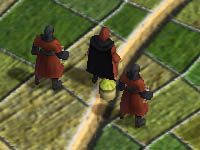

Scenario-Specific Units
Empires of the Smoky Skies
Includes a variety of steam-powered Airships and Landships.
Airship
Move: 6; Strength: 65




Sky Fortress
Move: 4; Strength: 80; Cost: 287; Required Resource: 1 Aetherium
Notes: "Most advanced airship unit. May act as base for a Flyer. Powerful
attacks, but vulnerable to Flyers."




Land Ironclad
Move: 3; Strength: 60




Landship
Movement: 4; Strength: 70

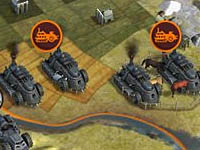


Land Leviathan
Move: 3; Strength: 85
Notes: A third, larger type of land ship.




Flyer
Range: 3; Ranged Strength: 18; Cost: 200
Notes: Some kind of wacky steam-powered biplane. "Excellent against airships,
but not very strong against land units. It also has a limited range, and must
base at a city or Sky Fortress."




Changes to Existing Units
With the move to the 100 hit point system, combat has been substantially rebalanced, and the Combat Strengths of many (or most) units have been changed. Some naval vessels are now melee-only and don't have a ranged attack. Some siege weapons now have lower ranged strength but a higher bonus vs. Cities, to reduce their effectiveness against other units.
Changed Unit Strengths:
| Unit | Melee Strength |
Ranged Strength |
Change | Notes |
| Scout | 5 | 0 | +1 | |
| Galley | 7 | 0 | +2, -3 | Barbarian Galley is now a melee unit |
| Warrior | 8 | 0 | +2 | Same strength for Brute, Jaguar, Maori Warrior |
| Archer | 5 | 7 | +1, +1 | No longer has -25% vs. Cities |
| Bowman | 7 | 9 | +1, +1 | No longer has -25% vs. Cities |
| Slinger | 4 | 7 | +2, +1 | |
| Spearman | 11 | 0 | +4 | Now +50% vs Mounted (down from 100%) |
| Hoplite | 13 | 0 | +4 | Now +50% vs Mounted (down from 100%) |
| Immortal | 12 | 0 | +4 | Now +50% vs Mounted (down from 100%) |
| Trireme | 10 | 0 | +10, -6 | Now is melee rather than ranged |
| Chariot Archer | 6 | 10 | +3, +3 | No longer has -25% vs. Cities |
| War Elephant | 9 | 11 | +3, +3 | No longer has -25% vs. Cities |
| Catapult | 7 | 8 | +2, -3 | Now has +200% vs. Cities (up from +50%), no longer requires Iron |
| Ballista | 8 | 10 | +3, -4 | Now has +200% vs. Cities (up from +50%), no longer requires Iron |
| Horseman | 12 | 0 | +2 | |
| Companion Cavalry | 14 | 0 | +2 | |
| Swordsman | 14 | 0 | +3 | Same strength for Mohawk Warrior; now upgrades to Musketman |
| Legion | 17 | 0 | +4 | Now upgrades to Musketman |
| Pikeman | 16 | 0 | +6 | Now upgrades to Lancer |
| Longswordsman | 21 | 0 | +5 | Same strength for Berserker, Samurai |
| Crossbowman | 13 | 18 | +3, +3 | No longer has -25% vs. Cities, now upgrades to Gatling Gun; same strength for Longbowman |
| Chu-Ko-Nu | 13 | 14 | +3, +3 | No longer has -25% vs. Cities, now upgrades to Gatling Gun |
| Knight | 20 | 0 | +2 | Move increased to 4 |
| Camel Archer | 17 | 21 | +7, +6 | No longer has -25% vs. Cities |
| Keshik | 15 | 16 | +7, +3 | |
| Naresuan's Elephant | 25 | 0 | +3 | |
| Trebuchet | 12 | 14 | +4, -2 | Now has +200% vs. Cities (up from +50%), no longer requires Iron |
| Hwach'a | 11 | 26 | +3, +1 | No longer requires Iron |
| Musketman | 24 | 0 | +8 | Same strength for Minuteman, Janissary |
| Cannon | 14 | 20 | +1, -6 | Now has +200% vs. Cities (up from +20%) |
| Lancer | 25 | 0 | +3 | Now upgrades to Anti-Tank Gun |
| Caravel | 20 | 0 | +20, -7 | Now a melee unit, with a Move of only 4 (down from 6), upgrades to Ironclad |
| Frigate | 25 | 28 | -5, +13 | Now upgrades to Battleship |
| Rifleman | 34 | 0 | +9 | Now upgrades to Great War Infantry |
| Ironclad | 50 | 0 | +15, -18 | Now a melee unit. Can now enter deep ocean, but also gets double movement in Coast and +33% bonus vs. Cities |
| Great War Infantry | 50 | 0 | +14 | Infantry has been split into WWI and WWII versions |
| Destroyer | 55 | 0 | +20 | No longer has a ranged attack |
| Battleship | 55 | 70 | -5, +38 | |
| Submarine | 35 | 60 | +10, 0 | |
| Infantry | 70 | 0 | +34 | This is the WWII version of Infantry |
| Fighter | 0 | 45 | +5 | |
| Bomber | 0 | 65 | +15 | |
| Great Artist | 0 | 0 | n/a | Is now the only GP that can trigger Golden Ages; loses Culture Bomb |
| Great Scientist | 0 | 0 | n/a | The ability to Discover Tech is now limited to 6 turns' worth of your Science output, instead of awarding a whole technology automatically. |
| Great General | 0 | 0 | n/a | Now gives +15% combat bonus to nearby units, down from +25%, but the Citadel now has Culture Bomb properties |
New Upgrade Paths
Unless otherwise noted, Unique Units follow the same upgrade path as the regular units that they replace (for example, the Legion, which replaces the Swordsman, upgrades to Longswordsman).
Warrior-> Swordsman-> Longswordsman-> Musketman-> Rifleman-> Great War Infantry-> Infantry-> Mechanized Infantry
Archer-> Composite Bowman-> Crossbowman-> Gatling Gun-> Machine Gun-> Mechanized Infantry
Spearman-> Pikeman-> Lancer-> Anti-Tank Gun-> Attack Helicopter
Horseman-> Knight-> Cavalry-> Landship-> Tank-> Modern Armor-> Giant Death Robot
Catapult-> Trebuchet-> Cannon-> Artillery-> Rocket Artillery
Galley-> Trireme-> Caravel-> Ironclad-> Destroyer
Dromon-> Galleass-> Frigate -> Battleship
Privateer-> Destroyer
Battering Ram-> Trebuchet
Triplane-> Fighter-> Jet Fighter
Great War Bomber-> Bomber-> Stealth Bomber
Chariot Archer-> Knight
Anti-Aircraft Gun-> Mobile SAM
 New Promotions
New Promotions
Boarding Party I, II, & III (hook icon): +15% Combat Strength in melee against
Naval
Units.
Coastal Raider I, II & III (skull icon): +20% Combat Strength when
attacking Cities. Steal gold equal to 33% of the damage inflicted on a city.
Prize Ships: Defeated enemy naval unit joins your side.
Double Movement in Coast: Double Movement in Coast.
Embarkation with Defense: Can embark onto Water Tiles. Embarked units
defend at double strength.
Feared Elephant: Enemy units receive -10% Combat Strength when adjacent
to any unit with this promotion.
The Siege promotions are no longer available to Siege units.
Changes to Social Policies
Changes from the basic version of Civilization V are marked in red.
Tradition
Tradition is best for small empires. Adopting Tradition greatly increases the rate of border expansion in cities and also grants 3 Culture in the Capital. Adopting all Policies in the Tradition tree will grant +15% Growth and a free Aqueduct in your first 4 cities.
- Aristocracy: +15% when building Wonders and +1 Happiness for every 10 Citizens in a City.
- Oligarchy: Garrisoned units cost no maintenance and cities with a garrison gain +50% Ranged Combat Strength.
- Legalism: Provides a free culture building in your first 4 cities.
- Monarchy: +1 Gold and -1 Unhappiness for every 2 Citizens in the Capital. (requires Legalism)
- Landed Elite: +10% Growth and +2 in the Capital. (requires Legalism)
Liberty
Liberty is best for civilizations which desire rapid expansion. Adopting Liberty will provide 1 Culture in every City. Adopting all policies in the Liberty tree will grant a free Great Person of your choice near the Capital.
- Republic: +1 Production in every City and +5% Production in cities when constructing Buildings.
- Citizenship: Tile improvement construction rate increased by 25% and a Worker appears near the Capital.
- Collective Rule: Speeds the training of Settlers by 50% in the Capital and a free Settler appears near the Capital. (requires Republic)
- Meritocracy: +1 Happiness for each City you own connected to the Capital and -5% Unhappiness from Citizens in non-occupied Cities. (requires Citizenship)
- Representation: Each city you found will increase the Culture cost of policies by 33% less than normal. Also starts a Golden Age. (requires Citizenship)
Honor
Honor improves the effectiveness of one's army in a variety of ways. Adopting Honor gives a +33% combat bonus VS Barbarians, and notifications will be provided when new Barbarian Encampments spawn in revealed territory. Gain Culture for the empire from each barbarian killed. Adopting all policies in the Honor tree will grant Gold for each enemy unit killed.
- Warrior Code: +15% Production when training Melee units and a Great General appears outside the Capital.
- Discipline: +15% combat strength for military Units which have another military Unit in an adjacent tile.
- Military Caste: Each City with a garrison increases empire Happiness by 1 and Culture by 2. (requires Discipline)
- Military Tradition: Military Units gain 50% more Experience from combat. (requires Warrior Code)
- Professional Army: Gold cost of upgrading Military Units reduced by 33% and +1 Local City Happiness from every defensive building (Walls, Castle, Arsenal, Military Base). (requires Military Caste)
Piety
Unlocks at Classical Era. This branch cannot be active at the same time as
Rationalism.
Adopting Piety allows you to build Shirnes and Temples in
half the usual time. Adopting all Policies in the Piety tree will provide a 20%
discount on all purchases of religious units and buildings with Faith, and Holy
Sites provide +3 Gold and +3 Culture.
- Organized Religion: +1 Faith from Shrines and Temples.
- Mandate of Heaven: 50% of excess Happiness added each turn to the amount of Culture that may be spent on Social Policies.
- Reformation: Culture increased by 33% in all cities which have built a World Wonder and the empire immediately enters a Golden Age. (requires Organized Religion)
- Theocracy: Temples increase a cities Gold output by 10%. (requires Organized Religion)
- Religious Tolerance: Reduces the Culture cost of future Policies by 10%. (requires Mandate of Heaven, Reformation)
Patronage
Unlocks at Medieval Era.
Patronage enhances the benefits of City-State friendship. Influence with
City-States degrades 25% slower than normal. Adopting all policies in the
Patronage tree will make other players' Influence with City-States decrease 33%
more per turn than usual.
- Aesthetics: Resting point for Influence level with all City-States is increased by 20.
- Philanthropy: Gifts of Gold to a City-State generate 25% more Influence.
- Scholasticism: All City-States which are Allies provide a Science bonus equal to 25% of what they produce for themselves. (requires Philanthropy)
- Cultural Diplomacy: Quantity of Resources gifted by City-States increased by 100%. Happiness from gifted Luxuries increased by 50%. (requires Scholasticism)
- Educated Elite: Allied City-States will occasionally gift you Great People. (requires Aesthetics, Scholasticism)
Order
Unlocks at Industrial Era. This branch cannot be active at the same time as
Freedom or Autocracy.
Order is best for large, sprawling empires, increasing the strength of the
empire based on the number of Cities it contains. Adopting Order will increase
Happiness by 1 per City. Adopting all Policies in the Order tree will grant
+2 Food, Production, Science, Gold, and Culture per
city. May purchase Great Engineers with Faith.
- United Front: Militaristic city states grant units twice as often when you are at war with a common foe.
- Nationalism: 15% attack bonus when fighting in friendly territory.
- Planned Economy: Factories increase a cities Science output by 25%. Build Factories in half the usual time.
- Socialism: Gold maintenance costs of Buildings reduced by 15%. (requires Planned Economy)
- Communism: +2 Production per City and +1 Production for every Mine or Quarry. (requires Socialism)
Autocracy
Unlocks at Industrial Era. This branch cannot be active at the same time as
Freedom or Order.
Autocracy is for militaristic civilizations, dreaming of world conquest.
Adopting Autocracy reduces Unit Gold Maintenance costs by 33%, allowing an
empire to field a larger military. Receive 10 Culture as
plunder for each point of Culture produced in the captured city. Adopting all Policies in the Autocracy tree
will grant a 25% attack bonus to all Military Units for
50 turns. May purchase Great
Generals and Great Admirals with Faith.
- Militarism: Gold cost of purchasing units reduced by 33%.
- Police State: +3 Local City Happiness from every Courthouse. Build Courthouses in half the usual time. The effectiveness of enemy spies is reduced by 25%. Your counterspies have a 25% increased chance of catching enemy spies. (requires Militarism)
- Populism: Wounded military units deal +25% damage than normal.
- Fascism: Quantity of Strategic Resources produced by the empire increased by 100%. All Great Generals receive +2 Movement. (requires Populism, Militarism)
- Total War: +25% Production when building Military Units and new Military Units start with +15 Experience. (requires Police State, Fascism)
Freedom
Unlocks at Industrial Era. This branch cannot be active at the same time as
Autocracy or Order.
Freedom is best for small, focused empires. In particular, it provides bonuses
for Great People and Specialists. Upon adopting Freedom, the rate at which Great
People are born is increased by 25%. Adopting all Policies in the Freedom tree
will increase the base yield from Great Tile Improvements by 100% and length of
Golden Ages increased by 50%. May purchase Great Artists
with Faith.
- Civil Society: Specialists consume only half the normal amount of Food.
- Constitution: +2 Culture from each World Wonder.
- Universal Suffrage: Combat Strength of Cities increased by 33%.
- Democracy: Specialist Population in Cities produce half the normal amount of Unhappiness. (Requires Civil Society)
- Free Speech: 8 units are maintenance free. (Requires Constitution)
Rationalism
Unlocks at Renaissance Era. This branch cannot be active at the same time as
Piety.
Rationalism improves the ability to use and generate Science. Adopting
Rationalism will grant +15% Science while the empire is
Happy. Adopting all
Policies in the Rationalism tree will grant 2 free
Technologies. May purchase Great Scientists with
Faith.
- Secularism: +2 Science from every Specialist.
- Humanism: +1 Local City Happiness from every University, Observatory and Public School.
- Free Thought: +1 Science from every Trading Post and +17% Science from Universities. (requires Secularism).
- Sovereignty: +1 Gold from Science buildings. (requires Humanism).
- Scientific Revolution: Boosts Science gainted from Research Agreements by 50%. (requires Free Thought).
Commerce
Unlocks at Medieval Era.
Commerce provides bonuses to naval empires, and those focused on Gold. Adopting
Commerce will boost Gold output in Capital City by 25%. Adopting all Policies in
the Commerce tree will grant +1 Gold from every Trading
Post and double Gold from Great Merchant trade missions. May purchase Great
Merchants with Faith.
- Naval Tradition: +1 Movement and +1 sight range for naval combat units. A Great Admiral appears. +2 Movement for all Great Admirals.
- Trade Unions: Maintenance paid on Roads and Railroads reduced by 33%. Harbors and Seaports gain +1 Gold.
- Mercantilism: Purchasing items in Cities requires 25% less Gold. +1 Science from every Mint, Market, Bank and Stock Exchange. (requires Trade Unions).
- Merchant Navy: +3 Production in coastal Cities (requires Naval Tradition).
- Protectionism: +1 Happiness from every Luxury Resource (requires Mercantilism).
New Buildings & Wonders
13 new buildings, 9 new Wonders, and 1 new National Wonder.
Wonder: Terracotta Army
Tech Requirement: Construction
Cost: 250 Cultural Output: 6 Great Person Points: 1 Artist Point
Effects: N/A
Notes: The mausoleum of Qin Shi Huang, the first Emperor of China.
Wonder: Hidden City of Petra
Tech Requirement: Currency
Cost: 250
Cultural Output: 1
Great Person Points: 1 Engineer Point
Effects: City must be built on or next to Desert. +1 Food, +1 Production, +1
Gold for all Desert tiles worked by this city (except Flood Plains). +6 Culture
once Archaeology is discovered. Provides a free Amphitheater in the city in which
it is built.
Wonder: Alhambra
Technology: Chivalry
Cost: 400; Provides: +1 Culture, +1 Great Artist point
Effects: All newly trained non-air Units in this city receive the Drill I
Promotion, improving combat strength when fighting in ROUGH Terrain. Provides a
free Castle in the city in which it is built. Boosts city Culture output by 20%.

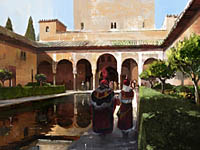
Wonder: Great Mosque of Djenne
Tech Requirement: Theology
Cost: 300 Cultural Output: 1 Faith
Output: 3 Great
Person Points: 1 Engineer Point
Effects: All Missionaries born in this city can
spread religion three times. Provides a free Mosque in the city in which it is
built.
Wonder: Neuschwanstein Castle
Tech Requirement: Railroad
Cost: 1060
Happiness Output: 2
Cultural Output: 4
Gold output: +6
Great Person Points: 1 Merchant Point
Effects: +3 Gold, +2 Culture, and +1 Happiness from every Castle. City must be
built within 2 tiles of a Mountain that is inside your territory.
Wonder: Leaning Tower of Pisa
Tech Requirement: Printing Press
Cost: 500
Cultural Output: 1
Great Person Points: 1 Artist Point
Effects: +25% generation of Great People in all Cities. A free Great Person of
your choice appears near the Capital.
Wonder: CN Tower
Tech Requirement: Telecommunications
Cost: 1250; Great Person Points: 1 Great Merchant Point
Effects: Provides a free Broadcast Tower in all cities. +1 Population in each
city and +1 Happiness per city.
Wonder: Hubble Space Telescope
Tech Requirement: Satellites
Cost: 1250
Great Person Points: 1 Science Point
Effects: 2 Great Scientists appear near the city where the Wonder was built.
Provides a free Spaceship Factory in the city in which it is built. +25%
Production when building Spaceship Parts.

Wonder: The Great Firewall
Tech Requirement: Computers
Cost: 1250
Effects: 99.9% reduction in effectiveness of enemy Spies in the city in which it
is built. All other cities In the Civilization get a 25% reduction in enemy Spy
effectiveness.
National Wonder: National Intelligence Agency
Tech Requirement: Radio
Effects: Provides an additional Spy and levels up all your existing Spies.
Provides a 15% reduction in enemy spy effectiveness. Must have a Police Station
in all cities.
Notes: All your spies get an extra level, including new spies recruited after
the Intelligence Agency is built.
Building: Shrine
Technology: Pottery
Notes: Generates +1 Faith.

Building: Pyramid
Technology: Pottery
Cost: 40 hammers; Maintenance: 1 gold
Benefit: +2 Faith, +2 Science
Notes: Mayan Unique Building; replaces Shrine. (A sacrificial temple produces
Science??)
Building: Stele
Technology: none
Cost: 40; Maintenance: 1; Provides: +2 Culture, +2 Faith
Effects: This Ethiopian Unique Building replaces the Monument. It increases a
city’s Culture and Faith, speeding growth of the city’s territory and the
Civilization’s acquisition of Social Policies and Religions.
Notes: Ethiopian Unique Building; replaces Monument. Stele are tall granite
obelisks from the 4th century AD found throughout Aksum, the ancient capital.

Building: Amphitheater
Technology: Drama & Poetry
Requires: Monument
Cost: 100; Maintenance: 2 Gold; Provides: +3 Culture, Artist slot
Effects: Increases the Culture of a city, speeding the growth of the city’s
territory and the Civilization’s acquisition of Social Policies.
Notes: New early Culture producing building, to
replace the Temple which now produces Faith instead of Culture.

Building: Constabulary
Technology: Banking
Cost: 160; Maintenance: 1
Notes: Increases the amount of time it takes an enemy spy to steal your
technology by 25%.

Building: Ceilidh Hall
Technology: Acoustics
Requirement: Amphitheater
Cost: 200; Maintenance: 2; Provides: +4 Culture, +3 Happiness, 1
Artist specialist slot
Effects: This Renaissance-era Celtic Unique Building replaces
the Opera House. It increases a city’s Culture and Happiness.
Notes: Unique Building for Celts, possibly replaces Opera House.
Provides additional happiness, culture, and an artist slot. A
ceilidh (pronounced "kaylee") is a Celtic social gathering, often involving
traditional music or dancing.

Building: Coffee House
Technology: Economics
Cost: 250; Maintenance: 2; Provides: +2 and +5% production, 1 Engineer slot.
Effects: This Renaissance-era Austrian Unique Building replaces the Windmill. It
increases a city’s Production and speed at which Great People are generated by
25%.
Notes: Austrian Unique Building, replaces Windmill (!).

Building: Police Station
Technology: Electricity
Requires: Constabulary
Cost: 300; Maintenance: 1
Notes: Increases the amount of time it takes an enemy spy to steal your
technology by 25%.
Building: Bomb Shelter
Technology: Telecommunications
Cost: 300; Maintenance: 1 Gold
Notes: Reduces population loss from nuclear attack by 75%.
Building: Recycling Center
Technology: Ecology
Cost: 500; Maintenance: 3
Effects: Provides 2 Aluminum. Maximum of 5 in your empire.
Building: Cathedral
Cost: 200 Faith; Maintenance: 0
Provides: +1 Faith, +3 Culture, +1 Happiness, Artist Specialist slot.
Effects: Can only be built in cities following a religion with the Cathedrals
belief. You may only purchase this building using Faith.
Building: Mosque
Cost: 200 Faith; Maintenance: 0
Provides: +3 Faith, +2 Culture
Effects: Can only be built in cities following a religion with the Mosques
belief. You may only purchase this building using Faith.
Building: Pagoda
Cost: 200 Faith; Maintenance: 0
Provides: +2 Faith, +2 Culture, +2 Happiness
Effects: Can only be built in cities following a religion with the Pagodas
belief. You may only purchase this building using Faith.
Changes to Existing Wonders & Buildings
Stonehenge: now gives +5 Faith and +1 Great Engineer Points. (screenshot)
Temple: now possibly produces Faith instead of Culture.
Monastery: is now purchased with Faith, and produces (+2 Faith, +2
Culture, more with Wine or Incense)
City Walls: now provides +5 Defense and +50 Hit Points to the city. (tooltip
in German)
Notre Dame: now gives +4 Faith (instead of +3 Culture) in addition to +10
Happiness and +1 Great Merchant point.
New Resources
All 7 of these new resources are Luxury Resources, providing +Happiness in addition to the tile bonuses. Two (Jewelry and Porcelain) are not available on the map, but are only provided by Mercantile City-States.
Truffles
Improved by: Hunting Camp
Bonus: +2 Gold
Found on: Forest, Marsh, Jungle


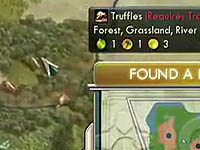

Crab
Improved by: Fishing Boats
Bonus: +1 Food, +1 Gold
Found on: Coast
Notes: The "net" cast from the Fishing
Boats is a box-shaped crab pot instead. Crab is a tradable luxury resource.




Citrus
Improved by: Plantation
Bonus: +1 Food, +1 Gold
Found on: Grassland, Plains
Notes: Citrus is a tradable luxury resource.
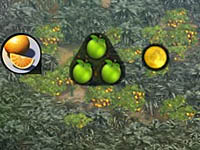



Salt
Improved by: Mine
Bonus: +1 Food, +1 Gold
Found on: Plains, Desert, Tundra
Notes: A tradable luxury resource.
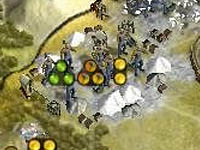



Copper
Improved by: Mine
Bonus: +2 Gold
Found on: Grassland, Plains, Desert, Tundra, Snow
Notes: Copper is a luxury resource.

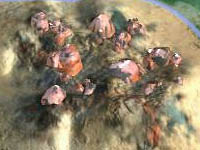


Porcelain
Yield: +2 Gold
Notes: A manufactured luxury resource unique to Mercantile City-States. This
resource is not located on the map, but is awarded by the City-State to its ally
civilization. It does appear that conquering a Mercantile City-State also give
you access to the resource; in
this
screen the Dutch player has annexed Marrakech, but the Porcelain shows in
the tooltip for city tile, and in the Happiness menu, the player is receiving a
Happiness bonus for Porcelain.


Jewelry
Yield: +2 Gold
A manufactured luxury resource unique to Mercantile City-States; it is produced
by the city-state rather than found on the map, similar to Porcelain.


Tulips: Several early previews claimed that Tulips are a manufactured luxury resource created by the Netherlands Polder unique improvement. However, this has not been verified via in-game screenshot; the portion of the Polder Civilopedia entry we've seen does not mention Tulips, and the list of font icons obtained through the beta patch does not contain a resource icon for Tulips, so it seems likely that either these previews were in error, or Tulips have since been removed.
New and Changed Improvements
Ancient Ruins can now provide 60 Faith.
Polder
Yield: +3 Food
Technology: Guilds
Built on: Marsh, Floodplains
Notes: A unique improvement for the Netherlands. It increases food production
in Marsh or Floodplain tiles. Polders do not produce Tulips, as
erroneously claimed in a few foreign previews. A "polder" is an
agricultural area of land reclaimed from marsh, lakebed or the sea, surrounded
by dikes (and a windmill to pump the water out as it seeps back in).
Holy Site
Notes: An improvement created by a Great Prophet. It adds +6 Faith production to the tile.
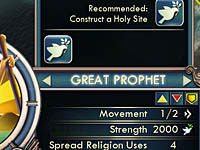


Trading Post
Technology: Guilds
A new graphic for the Trading Post (as indicated by the mouse-over
tooltip). The Trading Post is now available with Guilds (a new Medieval era
technology) instead of Trapping.
Citadel
Notes: The Citadel, which is a special Fort created by sacrificing a Great General, appears to have received an additional ability. According to the translation of this tooltip: In addition to providing +100% defensive bonus for the unit stationed on it and doing 30 damage to any enemy units that end their turn adjacent to the Citadel (not cumulative with other Citadels), it now appears that the Citadel, when placed, acts like a Great Artist's Culture Bomb, extending the civilization's borders by 1 hex around the Citadel, and potentially incurring a diplomatic penalty if this takes territory away from a neighbor. The Citadel can be placed within 1 hex of your borders (but presumably only in friendly or neutral territory as with the Culture Bomb).
New Natural Wonders
Mount Sinai: +8 Faith
Sri Pada: +2 Food, +4 Faith, +2 Happiness

Mount Kailash: +6 Faith if worked, +2 Happiness if within your borders.

Uluru/Ayer's Rock: +2 Food, +6 Faith


Preview Links
2K's Announcement
Official Website
GameSpot 2/16 preview
IGN 2/16 preview
Kotaku 2/16 preview
Webhallen.com product description
VideoGamer.com GDC preview
DesktopReview GDC info
GameSpy Preview
PCGamer GDC Preview
DigitalTrends GDC Preview
Venture Beat 3/13 Preview
GamesRadar 3/13 Preview
GameReactorTV GDC interview
with Ed Beach
2K's Release Date announcement
PAX Sunday demo at twitchtv
PAX demo at YouTube: Part 1,
Part 2
PAX coverage at Destructoid
Civforum.de interview with Ed Beach (click the Spoiler button for the English
version)
Gamers' Guide to Life PAX audio interview with
Dennis Shirk
2K Forums Sweden 4/20 reveal thread
GameSpy 5/10 preview
Kotaku 5/10 preview
VentureBeat 5/10 preview
Destructoid 5/10 preview
TheVerge 5/10 Smokey Skies scenario preview
Gamespot 5/10 Celts gameplay walkthrough
PCGamer 5/10 preview
Destructoid video preview
PCGames.de video preview
"Lead Your Civ to
Greatness" trailer video
"Cultivate and Expand"
trailer video


